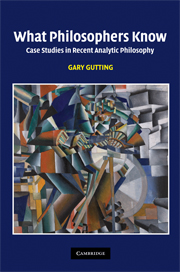Book contents
- Frontmatter
- Contents
- Acknowledgments
- Introduction
- PART I HOW DOES THAT GO? THE LIMITS OF PHILOSOPHICAL ARGUMENT
- PART II ARGUMENTS AND CONVICTIONS
- PART III PHILOSOPHICAL TRUTH AND KNOWLEDGE
- 9 Rorty against the world: philosophy, truth, and objectivity
- 10 Philosophical knowledge: conclusions and an application
- References
- Index
10 - Philosophical knowledge: conclusions and an application
Published online by Cambridge University Press: 05 June 2012
- Frontmatter
- Contents
- Acknowledgments
- Introduction
- PART I HOW DOES THAT GO? THE LIMITS OF PHILOSOPHICAL ARGUMENT
- PART II ARGUMENTS AND CONVICTIONS
- PART III PHILOSOPHICAL TRUTH AND KNOWLEDGE
- 9 Rorty against the world: philosophy, truth, and objectivity
- 10 Philosophical knowledge: conclusions and an application
- References
- Index
Summary
The question I've posed in this book is why people outside the discipline of philosophy should pay attention to what philosophers say, and my answer is that philosophers know things about topics that are important to non-philosophers. In this conclusion I first summarize the view of philosophical knowledge that has emerged from my case studies and then offer the example of religious belief as one illustration of the essential role philosophical knowledge should play in non-philososphical thinking.
A PICTURE OF PHILOSOPHICAL KNOWLEDGE
On any account, philosophy is concerned with our convictions – beliefs about fundamental human issues that are deep-rooted in our experiences and practices. According to the view that I've called philosophical foundationalism, the project of philosophy is to provide compelling arguments for or against our convictions, so that our beliefs and lives can be put on a solid rational basis. But, I have maintained, one of the most important achievements of recent philosophy has been to discredit this foundationalism. Philosophers themselves have given good reason to believe that our convictions do not require (and are unlikely, in any case, to receive) compelling philosophical justification. This, of course, is hardly news to most analytic philosophers. Nonetheless, our commitment to rigorous argument as the principal engine of philosophical inquiry often implicitly brings us back to the foundational model, even though we know we have little hope of finding the sort of premises that will make this model effective.
- Type
- Chapter
- Information
- What Philosophers KnowCase Studies in Recent Analytic Philosophy, pp. 224 - 242Publisher: Cambridge University PressPrint publication year: 2009



